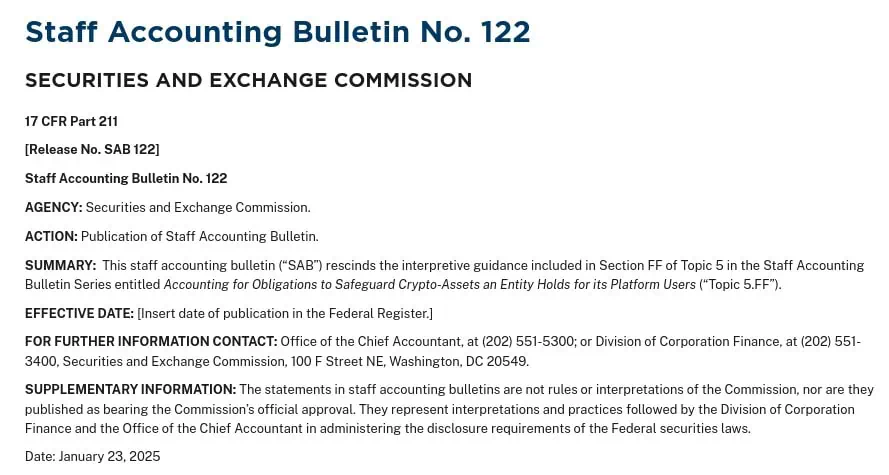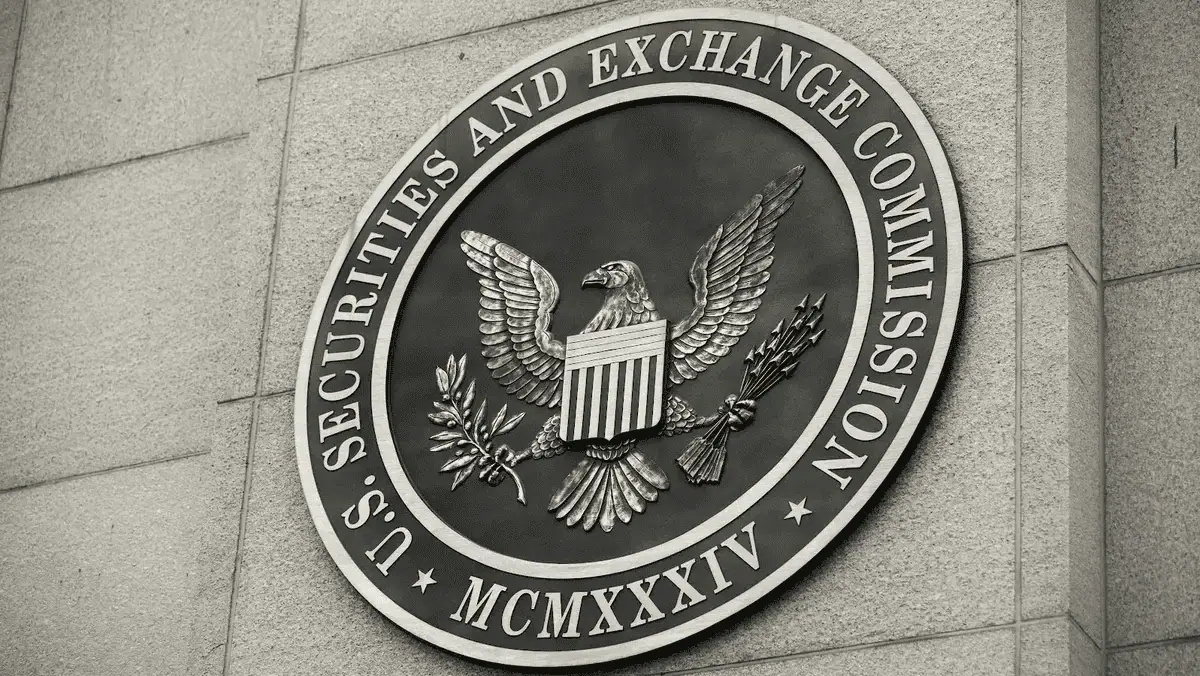
The US Securities and Exchange Commission (SEC) has removed the controversial SAB 121 rule, which required banks to record cryptocurrencies as liabilities. With this decision, the agency is opening the doors to institutional custody of digital assets in the country.
The SEC has decided to repeal the controversial SAB 121 rule in a move that has been described as a inflection point for the cryptocurrency industry in the United States.
As reported by this media, this regulation, which was implemented in 2022, required banks and other regulated financial institutions to register their clients' cryptocurrencies as liabilities on their balance sheets, which generated intense debate and criticism from the industry due to the limitations it entailed and which affected its growth.
However, on January 23, the federal agency made a historic announcement, which marks a significant shift in its regulatory stance towards digital assets.
The repeal of SAB 121 removes barriers and obstacles to institutional custody of this asset class. Now, in its place, the agency has introduced Staff Accounting Bulletin No. 122 (SAB 122), which allows financial institutions to manage their clients’ cryptocurrency holdings.

New SEC leadership begins to remove obstacles for cryptocurrencies
SAB 121 had been a major stumbling block to institutional adoption of cryptocurrencies in the United States. By requiring banks to record these assets as liabilities, the rule increased the operational costs and risks associated with cryptocurrency custody, discouraging many financial institutions from entering the market, despite growing investor interest in digital assets.
Now, with the removal of this barrier, more banks and financial institutions are expected to join the custody of cryptocurrencies. In fact, this decision could make Galaxy Digital's predictions come true, which in a report published in early 2025 estimated that at least 4 major American banks could begin offering cryptocurrency custody services this year.
Galaxy Digital noted that new regulations by the US Office of the Comptroller of the Currency and the transformation of the country's regulatory agencies under the new Donald Trump administration would be a key catalyst for this adoption.
The repeal of SAB 121 is part of these expected changes in federal agencies, which are now seeking to adapt their regulations to the growing demand of institutional investors for exposure to digital assets. In line with this, cryptocurrency custody could become un essential service for banks seeking to maintain their competitiveness.
The implications of SAB 122 for the development of the crypto industry
By facilitating institutional custody, SAB 122 regulations could accelerate the mass adoption of digital assets in the country, as institutional investors would have greater confidence in the security and regulation of this market.
Furthermore, the SEC’s decision could spur innovation in the financial sector. With more banks offering crypto custody services, new cryptocurrency-based products and solutions are likely to emerge, such as investment funds, insurance, and loans backed by digital assets. This, in turn, could attract more traditional investors to the crypto space, increasing liquidity and market stability.
On the other hand, the repeal of SAB 121 also reflects a shift in the SEC’s regulatory approach to cryptocurrencies. During the administration of former Chairman Gary Gensler, the agency took a stricter and more cautious stance, leading to tensions with the industry. However, with the arrival of new leaders and pressure from lawmakers and market players, the SEC appears to be taking a more balanced and proactive approach.
Mark Uyeda, who was named acting SEC chairman earlier this week, established a new task force focused on digital assets as one of his first moves toward regulatory clarity for cryptocurrencies in the United States.
A new chapter for cryptocurrencies
The SEC’s decision has been met with enthusiasm by much of the crypto industry. Hester Peirce, SEC Commissioner and known as the “Crypto Mom” for her support of innovation in the sector, celebrated the repeal of SAB 121 in a message on social media.
“Bye, bye SAB 121! It wasn’t fun”, Peirce wrote in X.

Several industry leaders have highlighted that this decision is an important step towards the legitimisation and effective regulation of cryptocurrencies. Michael saylor, MicroStrategy's chief executive, welcomed the agency's decision, noting that U.S. banks will now be able to hold cryptocurrencies.
Likewise, Fred Thiel, CEO of Marathon Digital, invited major banks to join the digital asset innovation.
«SAB121 repealed. Bring on the big banks!», Thiel wrote in X.
Looking at the future outlook, the repeal of SAB 121 is expected to drive greater collaboration between traditional financial institutions and cryptocurrency firms. This could lead to the creation of new standards and best practices for the custody and management of digital assets, which would benefit both investors and the industry at large.
Overall, the removal of SAB 121 marks the beginning of a new chapter for cryptocurrencies in the United States. By removing a key regulatory barrier, the SEC is making it easier for banks and other financial institutions to enter this market, which could accelerate mass adoption of digital assets.


